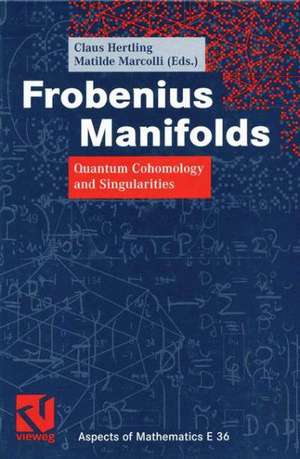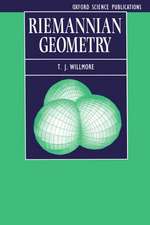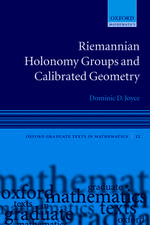Frobenius Manifolds: Quantum Cohomology and Singularities: Aspects of Mathematics, cartea 36
Editat de Claus Hertling Klas Diederich Editat de Matilde Marcollien Limba Engleză Paperback – 10 ian 2012
Din seria Aspects of Mathematics
- 18%
 Preț: 784.13 lei
Preț: 784.13 lei -
 Preț: 387.75 lei
Preț: 387.75 lei - 15%
 Preț: 643.34 lei
Preț: 643.34 lei -
 Preț: 420.97 lei
Preț: 420.97 lei -
 Preț: 491.82 lei
Preț: 491.82 lei - 15%
 Preț: 637.59 lei
Preț: 637.59 lei -
 Preț: 452.03 lei
Preț: 452.03 lei - 18%
 Preț: 779.71 lei
Preț: 779.71 lei - 18%
 Preț: 893.05 lei
Preț: 893.05 lei - 15%
 Preț: 470.88 lei
Preț: 470.88 lei -
 Preț: 386.81 lei
Preț: 386.81 lei -
 Preț: 477.89 lei
Preț: 477.89 lei -
 Preț: 371.73 lei
Preț: 371.73 lei -
 Preț: 354.21 lei
Preț: 354.21 lei -
 Preț: 383.93 lei
Preț: 383.93 lei - 15%
 Preț: 586.88 lei
Preț: 586.88 lei - 15%
 Preț: 464.82 lei
Preț: 464.82 lei -
 Preț: 386.61 lei
Preț: 386.61 lei -
 Preț: 329.66 lei
Preț: 329.66 lei - 15%
 Preț: 639.73 lei
Preț: 639.73 lei -
 Preț: 394.87 lei
Preț: 394.87 lei -
 Preț: 393.52 lei
Preț: 393.52 lei -
 Preț: 422.31 lei
Preț: 422.31 lei - 18%
 Preț: 792.19 lei
Preț: 792.19 lei - 15%
 Preț: 503.83 lei
Preț: 503.83 lei -
 Preț: 385.08 lei
Preț: 385.08 lei -
 Preț: 395.85 lei
Preț: 395.85 lei - 15%
 Preț: 475.28 lei
Preț: 475.28 lei - 24%
 Preț: 791.47 lei
Preț: 791.47 lei -
 Preț: 418.83 lei
Preț: 418.83 lei -
 Preț: 383.33 lei
Preț: 383.33 lei -
 Preț: 352.25 lei
Preț: 352.25 lei -
 Preț: 382.75 lei
Preț: 382.75 lei - 20%
 Preț: 356.73 lei
Preț: 356.73 lei -
 Preț: 484.08 lei
Preț: 484.08 lei -
 Preț: 485.07 lei
Preț: 485.07 lei - 20%
 Preț: 354.74 lei
Preț: 354.74 lei - 15%
 Preț: 467.93 lei
Preț: 467.93 lei - 15%
 Preț: 467.79 lei
Preț: 467.79 lei -
 Preț: 457.03 lei
Preț: 457.03 lei -
 Preț: 419.81 lei
Preț: 419.81 lei -
 Preț: 421.17 lei
Preț: 421.17 lei
Preț: 704.36 lei
Preț vechi: 828.66 lei
-15% Nou
Puncte Express: 1057
Preț estimativ în valută:
134.78€ • 141.08$ • 112.18£
134.78€ • 141.08$ • 112.18£
Carte tipărită la comandă
Livrare economică 31 martie-14 aprilie
Preluare comenzi: 021 569.72.76
Specificații
ISBN-13: 9783322802385
ISBN-10: 3322802388
Pagini: 396
Ilustrații: XII, 378 p.
Dimensiuni: 170 x 240 x 21 mm
Greutate: 0.63 kg
Ediția:Softcover reprint of the original 1st ed. 2004
Editura: Vieweg+Teubner Verlag
Colecția Vieweg+Teubner Verlag
Seria Aspects of Mathematics
Locul publicării:Wiesbaden, Germany
ISBN-10: 3322802388
Pagini: 396
Ilustrații: XII, 378 p.
Dimensiuni: 170 x 240 x 21 mm
Greutate: 0.63 kg
Ediția:Softcover reprint of the original 1st ed. 2004
Editura: Vieweg+Teubner Verlag
Colecția Vieweg+Teubner Verlag
Seria Aspects of Mathematics
Locul publicării:Wiesbaden, Germany
Public țintă
ResearchCuprins
Gauss-Manin systems, Brieskorn lattices and Frobenius structures (II).- Opposite filtrations, variations of Hodge structure, and Frobenius modules.- The jet-space of a Frobenius manifold and higher-genus Gromov-Witten invariants.- Symplectic geometry of Frobenius structures.- Unfoldings of meromorphic connections and a construction of Probenius manifolds.- Discrete torsion, symmetric products and the Hubert scheme.- Relations among universal equations for Gromov-Witten invariants.- Extended modular operad.- Operads, deformation theory and F-manifolds.- Witten’s top Chern class on the moduli space of higher spin curves.- Uniformization of the orbifold of a finite reflection group.- The Laplacian for a Frobenius manifold.- Virtual fundamental classes, global normal cones and Fulton’s canonical classes.- A note on BPS invariants on Calabi-Yau 3-folds.- List of Participants.
Notă biografică
Prof. Dr. Claus Hertling, Institut für Mathematik, Universität Mannheim, Germany
Prof. Dr. Matilde Marcolli, Max-Planck-Institute for Mathematics, Bonn, Germany
Prof. Dr. Matilde Marcolli, Max-Planck-Institute for Mathematics, Bonn, Germany
Textul de pe ultima copertă
Frobenius manifolds are complex manifolds with a multiplication and a metric on the holomorphic tangent bundle, which satisfy several natural conditions. This notion was defined in 1991 by Dubrovin, motivated by physics results. Another source of Frobenius manifolds is singularity theory. Duality between string theories lies behind the phenomenon of mirror symmetry. One mathematical formulation can be given in terms of the isomorphism of certain Frobenius manifolds. A third source of Frobenius manifolds is given by integrable systems, more precisely, bihamiltonian hierarchies of evolutionary PDE's. As in the case of quantum cohomology, here Frobenius manifolds are part of an a priori much richer structure, which, because of strong constraints, can be determined implicitly by the underlying Frobenius manifolds. Quantum cohomology, the theory of Frobenius manifolds and the relations to integrable systems are flourishing areas since the early 90's. An activity was organized at the Max-Planck-Institute for Mathematics in 2002, with the purpose of bringing together the main experts in these areas. This volume originates from this activity and presents the state of the art in the subject.
Caracteristici
Aktuelles aus der mathematischen Forschung


















